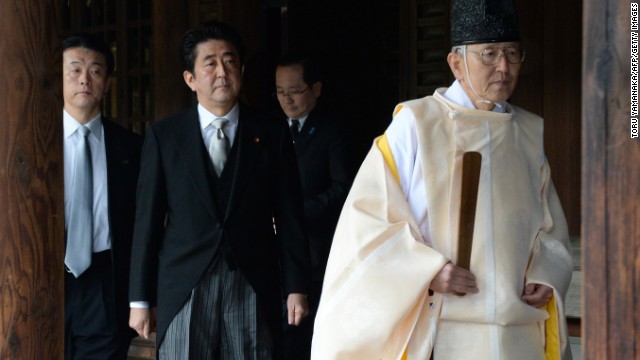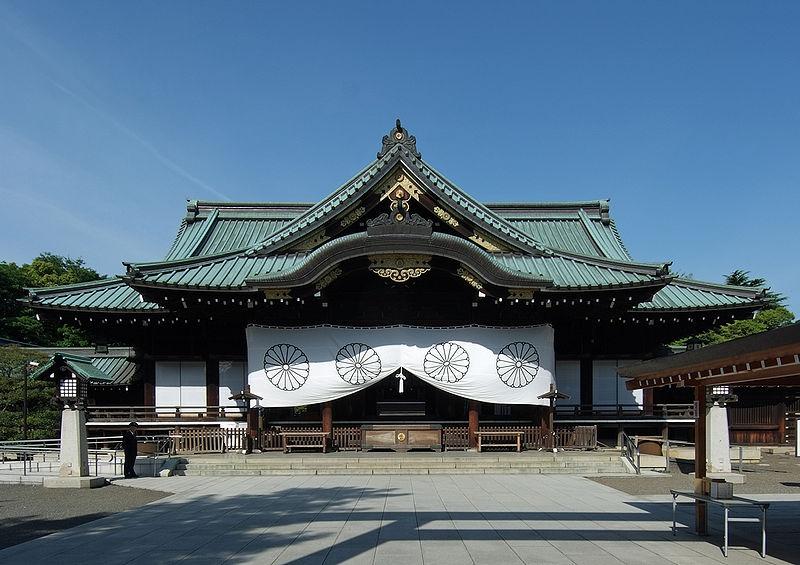Japan’s neighbours are against it. Its most important ally is against it. His own coalition partner is against it. Anyone who’s not aligned with the right-wing is against it. So why is prime minister Shinzo Abe so bull-headedly set on visiting Yasukuni? Simply because it’s an important but symbolic footstep along the path to rewriting history and reviving ‘a strong Japan’.
An editorial in The Japan Times yesterday spells out the reckless thoughtlessness of Abe’s recent visit. In persisting in his misguided action, the prime minister not only brings himself and his country into disrepute, but the religious institution he is so cynically exploiting for his own political ends.
**********************************************************************

Abe makes a strident political point by visiting Yasukuni (pic courtesy CNN)
EDITORIAL – Another backward step by Abe
DEC 27, 2013 Japan Times
Prime Minister Shinzo Abe’s visit Thursday to Yasukuni Shrine, Japan’s war shrine, is a thoughtless act that could lead Japan into isolation in the international community. It also revealed his shallow understanding of the immense destruction that Japan’s wars in the 1930s and 1940s brought about and the role that Yasukuni Shrine played in wartime Japan.
At the very least Abe’s visit will put Japan into a very difficult position in the region by reminding other Asians of their or their ancestors’ suffering at the hands of Japan during its colonial rule, war of aggression and military occupation. The visit could also have wider consequences for Japan as shown by the fact that the United States — Japan’s security alliance partner — officially and publicly expressed its disappointment at his visit.
Abe visited Yasukuni Shrine — his first as prime minister — on the first anniversary of the establishment of his current Cabinet. He had repeatedly said that it was a “matter of the greatest regret” that he could not pay a visit to Yasukuni — which enshrines not only Japan’s 2.46 million war dead but also 14 Class-A war criminals — during his first stint as prime minister from September 2006 to September 2007. In connection with his visit, Abe said, “I paid a visit to Yasukuni Shrine and expressed my sincere condolences, paid my respects and prayed for the souls of all those who had fought for the country and made ultimate sacrifices.”

Left to its own, without interference from belligerent right-wingers, Yasukuni could be a worthy and peaceful memorial (courtesy Wikicommons)
He also visited Chinreisha, a shrine in the Yasukuni compound that was built to “pray for the souls of all the people regardless of nationalities who lost their lives in the war, but not enshrined in Yasukuni Shrine,” and said, “Japan must never wage a war again … [and] must be a country which joins hands with friends in Asia and friends around the world to realize peace of the entire world.”
But the prime minister’s statement ignores the fact that Yasukuni Shrine served as a state ideological apparatus to mobilize Japanese for its wars by instilling the idea that it is a great honor for soldiers to die for their country, and also to suppress sorrow and resentment over the personal sacrifices made. It was not a facility to console the souls of dead soldiers. Rather the Japanese military used the shrine as a device to persuade soldiers (and by extension their families and the public at large) to accept death in battle in exchange for their enshrinement at the shrine. Given the nature of the shrine, Abe’s no-war pledge rings hollow.
The U.S., which wants to avoid raising tensions in East Asia, has been advising Abe to restrain from visiting Yasukuni Shrine. The fact that he ignored this advice shows he is placing greater priority on his own political agenda than on security ties with Japan’s most important partner. After his visit, the U.S. government issued a statement saying, “Japan is a valued ally and friend. Nevertheless, the United States is disappointed that Japan’s leadership has taken an action that will exacerbate tensions with Japan’s neighbors.”
Abe seems to ignore the fact that Japan was defeated in World War II and that there is a possibility that the U.S. and other countries will regard his actions aimed at “breaking away from the postwar regime” as a destabilizing factor. He must realize that continuing on such a path could damage relations with the U.S. and further harm already tense ties with Japan’s neighbors. Abe must take responsibility for harming Japan’s diplomatic and security environment through his thoughtless, self-complacent act. He must place the nation’s interests ahead of his own political agenda.

Yesterday I discovered that Japan’s National Memorial Service for War Dead (全国戦没者追悼式) which is held every year with the Emperor in attendance also honors war criminals. Kind of interesting that the Japan Times and foreign media don’t report on that one.
On this issue, I side with Abe. Shinto forgives everyone who is dead no matter what they did while they were alive. If you don’t forgive, bad things can happen. This is why a rebel who fought against the government such as Taira no Masakado is a major god in Shinto (the Kanda Daimyojin at Tokyo) or a former political criminal such as Sugawara no Michizane is now Tenjin (another major god with various Tenmangu shrines all across Japan).
This is a tough thing to say, but as a religion I think this is the correct choice. You must forgive everyone. Jesus forgave Judas (Judas rejected it, but that’s Judas’s problem), and the Buddha forgave Devadatta (and Devadatta is prophesied to become a buddha himself in the future).
Thank you for the comment. Two points by way of response: 1) Forgiveness is something offered to someone who has done you wrong. Forgiving someone on your own side isn’t worth very much and might well be construed as a deliberate insult. How would you feel if I said I’m willing to forgive my brother for killing your family? Not too happy, I dare say. 2) I’m not sure why you should call Sugawara no Michizane a political criminal. It would be fairer to say he was a wronged statesman. Moreover, I think you’re missing the point about his deification, which was nothing to do with forgiveness but everything to do with fear that his angry spirit was causing destruction and wreaking revenge.